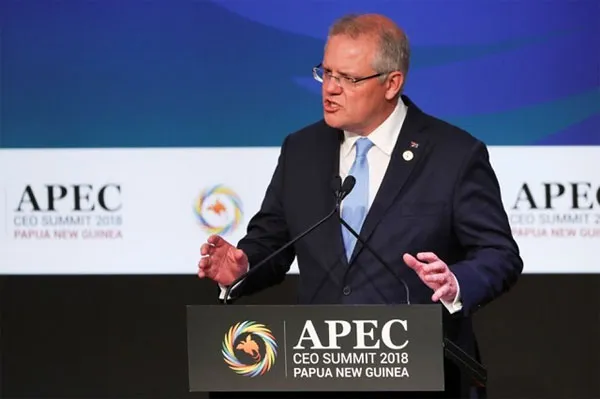Nước Úc đã tiếp nối Mỹ, Israel và một số quốc gia Tây Âu rút khỏi hiệp ước toàn cầu về di trú của Liên Hiệp Quốc, là hiệp ước yêu cầu các bên ký kết không tùy tiện giam giữ dân nhập cư.
Thủ tướng Úc cho biết nếu tham gia hiệp ước sẽ có hại cho an ninh quốc gia vì không thể phân biệt được các trường hợp nhập cư hợp pháp và bất hợp pháp.

Thủ tướng Scott Morrison tại Hội nghị APEC 2018. Ảnh: Reuters
Với chính sách nhập cư chặt chẽ, những người đến Úc xin tị nạn bằng tàu thuyền cho biết họ không được phép nhập cảnh vào Úc. Họ sẽ được đưa đến hai trại tạm giam ở các đảo nhỏ của nước này ở Nam Thái Bình Dương cho đến khi được một nước khác chấp nhận cho tị nạn hoặc là phải quay trở về quê hương. Các trại tạm giam này đã hứng nhiều chỉ trích từ Liên Hiệp Quốc và các tổ chức nhân quyền.
Việc rút khỏi hiệp ước di trú Liên Hiệp Quốc của Úc là động thái mới nhất nhằm thắt chặt việc nhập cư, nằm trong chuỗi chính sách mới nhằm mục đích hỗ trợ cho việc tái tranh cử của Thủ tướng Morrison trong kỳ bầu cử sẽ diễn ra tháng 5/2019.
Kết quả các cuộc thăm dò ý kiến cho thấy chính phủ bảo thủ của ông Morrison đang có viễn cảnh phải chịu thất bại trong kỳ bầu cử sắp tới.
Mỗi năm ghi nhận có khoảng 190.000 lượt người xin nhập cư vào Úc. Ông Morrison trong tuần cho biết chính phủ của ông muốn cắt giảm con số này, và hướng chính sách này đã chiếm được đa số ý kiến đồng tình.
Theo kết quả thăm dò công bố bởi Fairfax-Ipsos hôm 19/11, có đến 45% ý kiến ủng hộ giảm tình trạng nhập cư trong khi chỉ có khoảng hơn 20% muốn tăng con số cho phép nhập cư.
Hồi tháng 10 vừa qua, chính phủ Úc tuyên bố sẽ thực hiện việc hạn chế người di cư đến một số thành phố lớn của Úc như Sydney, Melbourne và Brisbane trong thời hạn lên đến 5 năm.
Tuy có khả năng giành được nhiều ủng hộ, vẫn có một số ý kiến cho rằng hành động này của chính phủ sẽ dẫn đến việc thiếu nguồn lực lao động.
Thống đốc Ngân hàng trung ương Úc đã có phát biểu hồi tháng 8 rằng làn sóng người nhập cư mới đã giúp Úc củng cố tăng trưởng kinh tế.
Australia rejects UN migration pact, sticks with hardline asylum-seeker policy
(Reuters) - Australia will not sign up to a United Nations migration agreement because it would compromise its hardline immigration policy and endanger national security, Prime Minister Scott Morrison said on Wednesday.
Australia joins the United States, Israel and several Eastern European countries in rejecting the U.N. Global Compact for Migration, which asks signatories not to detain would-be migrants arbitrarily and to use detention only as a last resort.
Morrison said that would jeopardize national security.
"The global compact on migration would compromise Australia's interest," Morrison told 2GB Radio. "It doesn't distinguish between those who illegally enter Australia and those who come the right way."
Under Canberra's tough immigration policy, which has bipartisan support, asylum seekers arriving by boat are told they will never be allowed to settle in Australia.
They are then detained in two detention centers on remote South Pacific islands until they are accepted by another nation or agree to return home. The camps have been widely criticized by the United Nations and human rights groups.
"Australia is a textbook case of how not to treat boat arrivals, by sending them offshore to endure abysmal conditions for years and trying to shirk its international responsibilities onto less-developed countries," said Elaine Pearson, Human Rights Watch's Australia director.
Australia's rejection of the U.N. pact is the latest move to tighten migration through a series of policies that are likely to form a central element of Morrison's bid for re-election at a national ballot that must be held by May 2019.
Opinion polls indicate his conservative government is on course for a landslide defeat.
Australia has an annual immigration cap of 190,000 places. Morrison said this week his government would likely reduce that threshold, a policy that is popular with voters.
A Fairfax-Ipsos poll published on Monday found 45 percent of voters wanted immigration reduced, while a little more than 20 percent wanted an increase.
Morrison's government said in October it would restrict new immigrants from living in Australia's largest cities - Sydney, Melbourne and Brisbane - for up to five years.
Although likely to win favor with voters, critics argued such a policy could lead to labor shortages.
Australia's central bank governor said in August an influx of new residents had helped to underpin strong economic growth.

